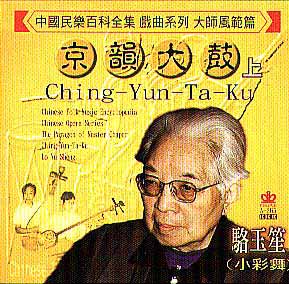Luo Yusheng, born in 1914, is a contemporary artist, whose stage name is Xiao Caiwu. She started to study under Su Huanting at the age of nine in order to playLaosheng(old man) roles in Peking Opera. At 14, she gave performances in singing without musical accompaniment in Nanjing. Then she formally switched to Jingyun Dagu at the age of 17. In 1934, Luo Yusheng studied the Liu School ofJingyun Dagu(storytelling in Beijing dialect while beating a drum, accompanied by two or three persons who play three-stringed instruments). Luo Yusheng is now in her 90s, but she still emceesQuyiTV programs and sometimes even stages a performance herself.
 |
| Poster of Luo Yusheng performing Jingyun Dagu |
During the several decades of her career as a
Jingyun Daguartist, Luo has absorbed the good points of the Bai School and the Junior Bai School, and incorporated them into her own style, which is based on that of the Liu School. She uses to the greatest advantages of her sweet voice and resonance, in particular her pleasant trill, as she performs fast notes one after the other, and achieves great success in a forceful and creaking voice, which rises to the highest pitch and deeply moves her audiences.
Luo Yusheng won the title of Queen of the Golden Voice, especially for her representative work,Hong Mei Ge. She sings in a deep tone, which, exciting and moving, expressing plaintive and profound sorrow, fills the minds of her audience. Her words run thus: "A fair girl that is deeply wronged. Her name is Li Huiniang, the ill-fated one who dies for her love." The first sentence is sung in a low tone, pleading pathetically. The strongly contrasted rhythm arouses the most sincere sympathy from the audience. The words are sung in a fast-moving tone that rises to the greatest height in flowing rhythm and then falls to a very low pitch. This became the greatest hit tune of the era.
BesidesHong Mei Ge, her representative works includeHearing Bells Ringing at Jian Ge,Ziqi Listening to Playing of Musical Instrument,Beating Drum While Scolding Cao and Zheng Qi Ge.
